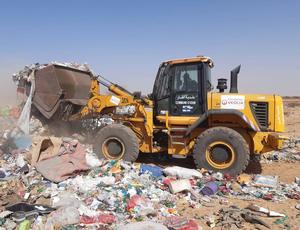Head of sorting and recovery operations in Oissel (Normandy), Romain Duthoit left for Atar at the end of 2021. After helping to identify the vehicles that would be given to the city of Atar, he trained the employees in their use and maintenance.

Was this assignment in Mauritania your first Veoliaforce assignment?
Romain Duthoit: Yes, and to be honest, I didn't become a volunteer with the Foundation to be able go to the other side of the world. My intention has always been to be part of a long-term project and, occasionally, when needed, to be able to lend a hand.
Your involvement in this project began with a helping hand...
RD: It so happens that, in my career, I have collected waste and, today, I am responsible for a sorting centre. When it came to identifying vehicles that could be given to the Atar town council to optimise waste management, I knew where in my region of Normandy I would find a loader and an Ampliroll truck (with roll-off containers) which no longer met local requirements but could still be used.
Your deployment has been delayed several times due to the health crisis. Was this wait frustrating?
RD: No, because we used this time to discuss and prepare (as best possible) the receipt of vehicles on site and the upcoming training. There was actually a lot of work to be done to convince the Atar services to accept the truck and the loader! They had, until now, only used old Mercedes dump trucks and could not picture being able to drive anything else. There were also fears about access to spare parts in the event of a breakdown. In short, we had to reassure them and explain that a few hundred kilometres away, in Senegal, the same type of vehicle was being used, that an after-sales service would therefore be possible, etc.
Were there any surprises on the ground? Good or bad?
RD: Our biggest difficulty was the language barrier. Very few Mauritanians speak French, the vast majority communicate only in Arabic. But we managed to understand each other! We had to, because they asked a lot of questions and we had to go over use and maintenance with them (lubrication, levels, filters, etc.), in particular of the loader.
How was your team at the Oissel sorting centre able to compensate for your absence?
RD: Everybody was very involved in the subject. I went to Atar but the entire team, indirectly, took part in the project. When I returned, I showed many pictures to explain what I had been doing for ten days.
What's the next step?
RD: The AIMF is leading a waste characterisation study carried out by a local design office to see what could be done in terms of recycling. Consumption patterns vary greatly from one population to another. Take, for example, paper-cardboard, it would be pointless to consider recycling it as the Mauritanians feed it to the goats! So, we are only at the beginning of the study, but waste collection has already taken on a new dimension in Atar.








